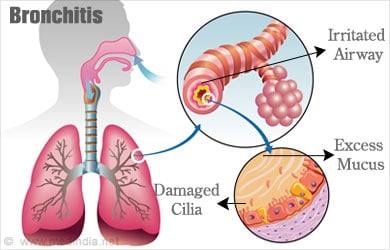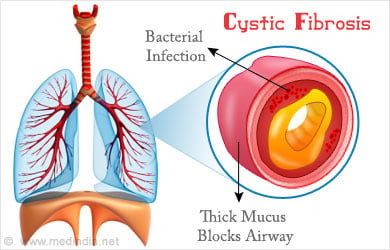- Coughing up blood - (http://www.nlm.nih.gov/medlineplus/ency/article/003073.htm)
- About Coughing up blood - (http://www.mayoclinic.org/symptoms/coughing-up-blood/basics/definition/sym-20050934)
- What is Coughing up Blood ? - (http://www.patient.co.uk/health/coughing-up-blood-haemoptysis)
What is Coughing up Blood - Symptom Evaluation?
Coughing up blood is most commonly associated with respiratory conditions like bronchitis, bronchiectasis, emphysema, lung cancer, pneumonia, pulmonary embolism, tuberculosis, cystic fibrosis and aspiration of foreign body in the respiratory tract.
Other conditions like systemic lupus erythematosus, congestive heart failure and use of anticoagulants can cause bloody sputum.
Severe bleeding from the nose or bleeding elsewhere in the gastrointestinal tract can mimic bloody sputum but evaluation helps in concluding the cause. Coughing up blood from lungs presents with blood stained mucus or frothy sputum or with streaks of blood in mucus.

Some of the causes that can present with bloody sputum are:
- Bronchitis – It is the inflammation of the bronchi in the lungs. Smoking predisposes to this condition. It can be caused by bacteria/viruses/ atypical organisms. It presents with shortness of breath, tightness in the chest, cough, bloody sputum etc. Physical examination, auscultation of lungs, chest X-ray and spirometry are useful in making the diagnosis.

- Pneumonia – It is the infection of the lung parenchyma. It presents with high grade fever, rusty sputum, chills, fatigue, shortness of breath, chest discomfort etc. It can be caused by bacteria/viruses/ atypical organisms. It may be diagnosed by auscultation of lungs, chest X-ray, blood investigations and sputum culture.
- Lung cancer – It may be a primary tumor of the lung tissue or associated lymph nodes. It can also be a metastatic tumor in the lungs that has spread from other organs. Common symptoms include fatigue, unintended weight loss, severe persistent cough with bloody/mucus sputum, wheezing, hoarseness of voice etc. Diagnosis is on the basis of examination, chest x-ray, CT scan chest, bronchoscopy (if tumor of the bronchus is suspected), blood investigations etc.
- Cystic fibrosis – It is a hereditary condition that leads to abnormal accumulation of thick mucus in the lungs, digestive tract and pancreas leading to recurrent infections. Sweat glands are also affected by this condition. It is transmitted in a recessive pattern. Common signs include clubbed fingers, recurrent episodes of pneumonia, nasal congestion, bloody sputum, constipation, clay coloured stools, bloating, weight loss etc. Diagnosis is concluded with sweat chloride test, chest x-ray, CT scan, stool test(for fat, trypsin, chemotrypsin), lung function tests, secretin stimulation test and serum electrolytes.

- Pulmonary embolism – It is a condition where the arteries in the lung get blocked due to blood clots that travel from lower limbs or other parts of the body. Common symptoms include dyspnea, dizziness, coughing up blood, cyanosis, chest pain, sweating etc. Diagnosis is confirmed on the basis of D-dimer levels, results of V/Q lung scan, Spiral CT scan, duplex ultrasonography of the vessels, chest X- ray and pulmonary angiogram.
- Pulmonary Tuberculosis – It is an infection of the lungs by a bacterium called mycobacterium tuberculae. It presents with persistent cough, night sweats, weight loss, coughing up blood, fever, chronic fatigue etc. Thorough physical examination, investigations like Mantoux test, chest X-ray, sputum cytology and culture are useful in confirming diagnosis.
- Congestive heart failure – It is a condition in which the heart is unable to pump effectively to supply blood to all parts of the body and leads to accumulation of fluid (congestion) in the legs, ankles, abdomen, lungs etc. Tests to evaluate normal function of organs such as kidney and thyroid, the levels of Brain Natriuretic Peptide (BNP, B-type natriuretic peptide), chest X-ray, echocardiogram, and electrocardiogram are some of the tests that help in diagnosing a congestive heart failure.

Frequently Asked Questions
1. Is coughing up blood an emergency?
Not always. But it does warrant evaluation of the cause for blood in sputum.
2. What are the common conditions that present with bloody sputum?
Coughing up blood is a common finding in conditions like bronchitis, pneumonia, emphysema, bronchiectasis, pulmonary embolism, lung cancer, tuberculosis, congestive heart failure, systemic lupus erythematosus etc.
3. How to differentiate whether coughing up blood is from lungs or any other source?
Coughing up blood from the respiratory tract is often frothy or blood stained or with streaks of blood in mucus.









